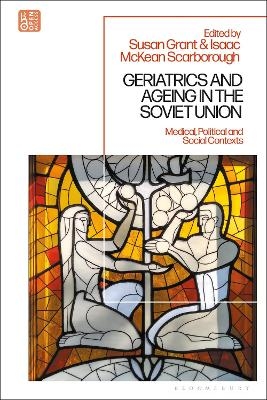
Geriatrics and Ageing in the Soviet Union
Bloomsbury Academic (Verlag)
978-1-350-27379-5 (ISBN)
Ageing was hardly a uniquely Soviet phenomenon: over the past fifty years, moreover, governments and societies have been dealing with steady increases in their ageing populations. Almost paradoxically, however, societal focus on this ageing population, its lives, and its social impact remains extremely limited. Compared to most sciences, gerontology is pitifully underfunded; geriatrics is amongst the least prestigious branches of medicine; and while the world’s population is growing undeniably older, great disagreement remains over what can and should be done in response. These were the same challenges that the USSR faced in the post-war decades (1945-1991), and the contributions included in this volume help to flesh out and contextualize the example of Soviet gerontology and geriatrics as one possible model of response.
Geriatrics and Ageing in the Soviet Union captures the growing interest in this important subject, demonstrating the influence of ageing on Soviet science and society and the impact of Soviet gerontology and geriatrics at a global level.
The book is available under a CC BY-NC-ND 3.0 licence on bloomsburycollections.com. Open access was funded by the Wellcome Trust and Liverpool John Moores University.
Susan Grant is Reader in Modern European History at Liverpool John Moores University, UK. She is the author of Physical Culture and Sport in Soviet Society (2013). Isaac McKean Scarborough is University Lecturer in Russian and Eurasian Studies at the Institute for History, Leiden University, The Netherlands.
Editors’ Introduction
Part I: Soviet Gerontology and Geriatrics
1. The Legend of Gilgamesh: Attempts towards its Fulfilment in Soviet Gerontology Vladislav Bezrukov (Institute of Gerontology, Ukraine) and Konstantin Duplenko (Kiev-Mohyla National University, Ukraine)
2. From the Collections of the Medical Museum: Duality in 1920s Soviet Ageing Research Maria Tutorskaya (Russian Medical Museum, Russia)
3. Ageing Minds and Bodies: Psychiatric Care for the Elderly People in the Post-War Soviet Union Aleksandra Brokman (Liverpool John Moores University, UK)
4. ‘Dolphin Babies’: The Late Soviet Project of Infant Swimming and the Creation of ‘a New Superhuman Being Anna Ozhiganova (Russian Academy of Sciences, Russia)
Part II: Designing Medical and Social Spaces for Elderly People in the Soviet Union
5. Age and City: Old Age and Urban Planning in Moscow and Kiev Botakoz Kassymbekova (Liverpool John Moores University, UK)
6. ‘A Quiet Old Age’: Designing Homes for Elderly People Susan Grant (Liverpool John Moores University, UK)
Part III: Representation and Perception
7 The Right to a Personal File: Archiving the Lives of Soviet Pensioners Alissa Klots (University of Pittsburgh, USA) and Maria Romashova (Perm University History Museum, Russia)
8. The New Soviet Babushka: Popular Perceptions of Elderly Women after Stalin Danielle Leavitt-Quist (Harvard University, USA)
Part IV: International Contexts
9. Ageing and Gerontology in the UK after 1945 Pat Thane (King’s College London, UK)
10. The Burden of Old Age: The Fate of Elderly People in the Polish People’s Republic Ewelina Szpak (Polish Academy of Sciences, Poland)
11. The Development of Museums of Medicine in Post-Soviet Countries and their Contribution to the History of Medicine Katarzyna Jarosz (International University of Logistics and Transport, Poland)
Epilogue James Chappel (Duke University, USA) and Isaac McKean Scarborough (Liverpool John Moores University, UK)
Index
| Erscheinungsdatum | 27.01.2023 |
|---|---|
| Zusatzinfo | 6 bw illus |
| Verlagsort | London |
| Sprache | englisch |
| Maße | 156 x 234 mm |
| Themenwelt | Geisteswissenschaften ► Geschichte ► Regional- / Ländergeschichte |
| Geschichte ► Teilgebiete der Geschichte ► Kulturgeschichte | |
| Studium ► Querschnittsbereiche ► Geschichte / Ethik der Medizin | |
| ISBN-10 | 1-350-27379-1 / 1350273791 |
| ISBN-13 | 978-1-350-27379-5 / 9781350273795 |
| Zustand | Neuware |
| Haben Sie eine Frage zum Produkt? |
aus dem Bereich


